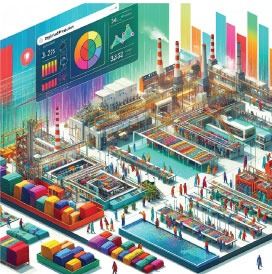- info@ficci.org.bd
- |
- +880248814801, +880248814802
- Contact Us
- |
- Become a Member
- |
- |
- |
- |
- |

The Ready-Made Garments (RMG) sector is the backbone of Bangladesh’s economy, contributing significantly to national growth. However, despite this success, the industry is at a crossroads. Global competition, increasing demands for faster production, and stricter requirements for sustainability and traceability are pressuring Bangladeshi factories to modernize. Compounding this challenge is the industry's reliance on traditional Wi-Fi networks, which are slow, unstable, and prone to disruptions. To meet these challenges head-on, private 5G networks offer an innovative solution that can transform the industry's future.
What is a Private 5G Network?
A private 5G network is a dedicated, high-speed internet network designed for specific locations like factories, schools, or hospitals. Unlike normal cellular networks shared by the public or open Wi-Fi prone to instability, a private 5G network provides faster speeds, better security, and reliable connections.
Imagine this: if normal cellular networks and Wi-Fi are like public roads filled with traffic, a private 5G network is your exclusive, well-paved highway. It ensures devices like robots, sensors, and automated systems in a factory can communicate without interruptions, enabling smooth operations.
This specialized connectivity is a game-changer for industries like garments, where speed, accuracy, and security are critical.
Why Connectivity Matters in Bangladesh’s Garments Industry?
In many Bangladeshi factories, unstable Wi-Fi connections create bottlenecks in operations, limiting the potential for adopting automation. This affects the entire production process, from cutting and sewing to material handling and quality control. For example:
In contrast, private 5G networks can overcome these limitations by offering reliable, secure, and high-speed connections tailored to the needs of the garments industry.
How 5G Can Revolutionize the Industry?
Here’s how private 5G networks can transform Bangladesh’s RMG sector:

2. Enhanced Worker Safety and Training
Workers in garment factories often face safety risks. Private 5G networks can power wearable safety devices that alert workers to hazardous conditions. Training programs can also leverage augmented reality (AR) tools, allowing workers to practice complex tasks in virtual environments, making learning faster and safer.
3. Improved Supply Chain Transparency
Global buyers are increasingly focused on ethical sourcing and sustainability. Private 5G networks enable blockchain technology to track every stage of production, from sourcing raw materials to delivering finished goods. This transparency builds trust with international buyers and secures long-term contracts.
4. Seamless Communication Between Machines
Private 5G networks can connect thousands of devices on a factory floor, ensuring real-time communication between machines. For example, a sensor detecting a material shortage can instantly alert an inventory system to replenish supplies. Such seamless integration reduces delays and enhances productivity.

Learning from Global Leaders
Bangladesh can draw inspiration from other countries that have successfully adopted 5G to modernize their industries:
Bangladesh, despite being a global leader in export volume, still relies heavily on labor-intensive methods. By adopting 5G, it can bridge this gap and remain competitive.
The Bigger Picture: Economic and Social Benefits
The adoption of private 5G networks could unlock immense benefits for Bangladesh:


Challenges and How to Overcome Them
While the benefits of 5G are clear, its implementation comes with challenges. Deploying private networks requires significant investment, and factory systems must be upgraded. Additionally, workers will need training to operate and manage new technologies.
To overcome these barriers, the government and private sector must collaborate. Policies that encourage investment in technology, such as tax incentives and subsidies, can ease the financial burden on factories. Public-private partnerships can also help scale 5G adoption across the industry.
A Vision for the Future
Bangladesh’s garments industry has always been a story of resilience and growth. From modest beginnings, it has risen to global prominence. But to sustain its success in an increasingly competitive world, the industry must embrace change.
Private 5G networks offer more than just faster connectivity—they represent an opportunity to redefine how garments are made, how workers are empowered, and how factories compete on the global stage. With the right investments and vision, Bangladesh can transform its garments sector into a model of innovation and sustainability, securing its place as a global leader for decades to come.





